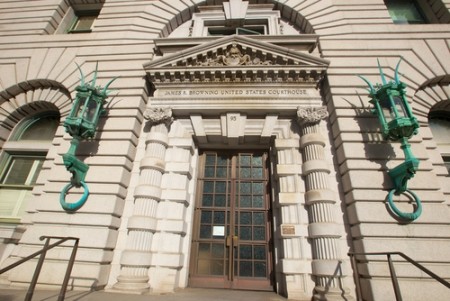Hawaii asks to go straight to 9th Circuit en banc review of Trump travel ban preliminary injunction

9th U.S. Circuit Court of Appeals.
President Donald Trump’s second order limiting travel from majority-Muslim countries is headed for the San Francisco-based 9th U.S. Circuit Court of Appeals—possibly the full court.
The state of Hawaii petitioned Tuesday for an initial en banc hearing on whether to let stand a preliminary injunction against the travel ban, the Los Angeles Times and Law360 (sub. req.) reported Wednesday. That would be a departure from the usual procedure, in which a three-judge panel makes the initial decision and the parties have the option to appeal to the full court.
The state’s petition (PDF) notes that the Richmond, Virginia-based 4th U.S. Circuit Court of Appeals decided Monday to hold an initial en banc hearing in a parallel case, International Refugee Assistance Project v. Trump. That case is also a challenge to a preliminary injunction, though the injunction covers less of the president’s executive order than the Hawaii case, State of Hawaii v. Trump.
Hawaii argues that the injunction in its case similarly “merit[s] the attention of the full court” because of the important issues presented.
“The lawfulness of President Trump’s executive action and the nationwide injunction imposed on Sections 2 and 6 by the Court below are unquestionably issues of pressing, nationwide concern,” the petition says.
The petition says Hawaii conferred with the federal government, which supports initial en banc review “if, but only if, the court determines that [it] would not delay” a resolution.
Briefing in the Hawaii case has been expedited, and oral arguments are scheduled for May 15 in Seattle, the Los Angeles Times says. Oral arguments the 4th Circuit case are scheduled for May 8.
The Hawaii district judge issued the injunction in March by converting it from a temporary restraining order. It was issued not long after President Trump signed his second executive order March 6. When issuing the preliminary injunction, Judge Derrick Watson found that the ban probably discriminates on the basis of religion in violation of the establishment clause of the First Amendment.
In so ruling, Watson expressly declined the federal government’s invitation not to consider evidence outside of the order itself, noting that the president had called the second ban “a watered-down version of the first one.”
In an appellate brief (PDF) filed Friday, the federal government argued that this argument would fail in a full trial because “only the official purpose of government action is material” under Supreme Court precedent. The order itself is facially neutral, the brief argues, and the state of Hawaii and individual plaintiff Ismail Elshikh have no standing to enforce the rights of foreign nationals.
The case will be the second time one of Trump’s executive orders reach the 9th Circuit. In February, the court heard oral arguments in a challenge to the original travel ban brought by the states of Washington and Minnesota. Audio of those arguments was live-streamed to 137,000 people, which an assistant circuit executive said was the largest audience for oral arguments since the 9th Circuit began live-streaming in 2015. The court ultimately let a temporary restraining order stand in that case, but without ruling on the First Amendment issue at the center of the Hawaii case.
The revised travel ban, which was written expressly to avoid the legal problems with the first ban, bars for 90 days admission of nationals from six majority-Muslim countries, dropping Iraq from the seven-country list in the original ban; suspends refugee admission for 120 days; caps refugee admission at less than half of the cap under the Obama administration. It expressly exempts dual citizens, green card holders, holders of valid visas, refugees already vetted and people who have been granted asylum.



